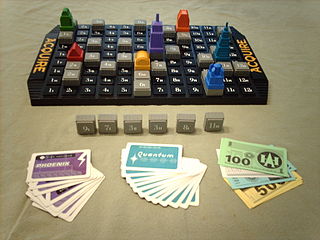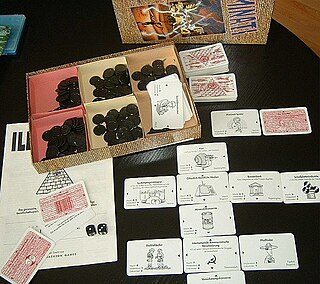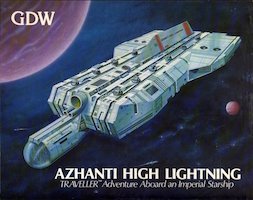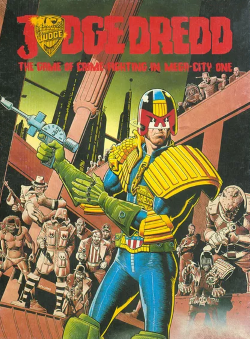Related Research Articles

Acquire is a board game published by 3M in 1964 that involves multi-player mergers and acquisitions. It was one of the most popular games in the 3M Bookshelf games series published in the 1960s, and the only one still published in the United States.

Illuminati is a card game made by Steve Jackson Games (SJG), inspired by the 1975 book, The Illuminatus! Trilogy, by Robert Anton Wilson and Robert Shea. The game has ominous secret societies competing with each other to control the world through various means, including legal, illegal, and even mystical. It was designed as a "tongue-in-cheek rather than serious" take on conspiracy theories. It contains groups named similarly to real world organizations, such as the Society for Creative Anachronism and the Symbionese Liberation Army. It can be played by two to eight players. Depending on the number of players, a game can take between one and six hours.

Cosmic Encounter is a science fiction–themed strategy board game designed by "Future Pastimes" and originally published by Eon Games in 1977. In it, each player takes the role of a particular alien species, each with a unique power to bend or break one of the rules of the game, trying to establish control over the universe. The game was inducted into the Academy of Adventure Gaming Arts & Design Adventure Gaming Hall of Fame in 1997.

White Bear and Red Moon is a fantasy board wargame set in the world of Glorantha, created by Greg Stafford and published in 1975. Stafford first tried to sell the game to established publishers, but despite being accepted by three different game companies, each attempt ended in failure; eventually he founded his own game company in 1974, the influential Chaosium, to produce and market the game.

Azhanti High Lightning is a science-fiction wargame, designed by Frank Chadwick and Marc W. Miller, illustrated by Paul R. Banner, Charmaine Geist, Richard Hentz, and Richard Flory, and published by Game Designers Workshop (GDW) in 1980. The title is the name of the large military starship that provides the setting for close-action combat between individuals on board. Azhanti High Lightning is the fourth Traveller boardgame published by GDW. It was republished in 2004 as part of Far Future Enterprises's (FFE) Traveller: The Classic Games, Games 1-6+. Originally Supplement 5: Lightning Class Cruisers was only available as part of this game, it was republished in 2000 as part of FFE's Traveller Supplements volume.

Cry Havoc is a board wargame published by Standard Games and Publications in 1981 that uses a complex set of rules to simulate medieval one-on-one combat.

Judge Dredd, subtitled "The Game of Crime-Fighting in Mega-City One", is a board game published by Games Workshop (GW) in 1982 that is based on the dystopian comic series Judge Dredd that appeared in the British comic magazine 2000 AD.
Wizards is a fantasy board game designed by Thomas Mosbø and Coral Mosbø.

Thieves' World is a role-playing game supplement published by Chaosium in 1981, based on the Thieves' World series of novels. It was notable for including rules and statistics allowing for its use with nine different fantasy and science-fiction RPG gaming systems.

Land of the Rising Sun is a role-playing game published by Fantasy Games Unlimited in 1980.
Tales of the Arabian Nights is a board game published by West End Games in 1985 based on One Thousand and One Nights.

Adventures in Fantasy is a role-playing game published by Excalibre Games in 1979, designed by Dave Arneson and Richard Snider. The game is a fantasy system, similar to early Dungeons & Dragons (D&D), which Arneson co-created. It received mixed to negative reviews in game periodicals, including The Space Gamer, Ares, and Pegasus, and ultimately flopped. Arneson later bought the rights to Adventures in Fantasy and published a new edition in 1981 through his own company Adventure Games.

Wizard's Quest is a fantasy board wargame published by Avalon Hill in 1979.
Time War, subtitled "A Game of Time Travel and Conflict", is a science fiction board wargame published by Yaquinto Publications in 1979.
Shooting Stars is a 1980 board game published by Yaquinto Publications.
Barbarian Prince is a solitaire board game published by the Dwarfstar Games line of Heritage Models in 1981.
Borderlands is a board game for 2–4 players published by Eon Products in 1982.
Chill: Black Morn Manor is a 1985 board game published by Pacesetter Ltd.

The Halls of the Dwarven Kings is an adventure published by Integrated Games in 1984 for any role-playing game system.

Acute Paranoia, published in 1986 by West End Games, is the first supplement for the light-hearted science fiction role-playing game Paranoia.
References
- 1 2 Goldberg, Eric (May 1981). "Games". Ares . Simulations Publications, Inc. (8): 29–30.
- 1 2 Johnson, Forrest (February 1981). "Capsule Reviews". The Space Gamer . Steve Jackson Games (36): 23.
- ↑ Livingston, Ian (April–May 1981). "Open Box". White Dwarf . Games Workshop (24): 14.
- ↑ "Top 100 Games of 1981". Games . No. 26. November–December 1981. p. 53.
- ↑ Varney, Allen (December 1993). "Social Board Games". Dragon . TSR, Inc. (200): 120.
- ↑ "Jeux & stratégie 17". October 1982.